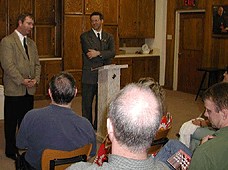
It is not often one can pray the rosary aloud walking through New Orleans’ French Quarter. But then again, I was not on an ordinary tour of the city.
There are two ways visitors can experience Louisiana.
You can take the beaten path that so often appears in the pages of major newspapers and travel features. This way is full of the ready-made experiences of the tourist who lives to tell his tale to others. This is Louisiana of the Mardi Gras celebrations, plantation houses, carefree summer festivals and historic museums.
However, there is a path less traveled and that is a journey through Catholic Louisiana which reveals a more authentic side of the state.
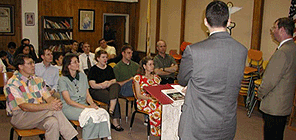
Timely Book
My trip through Louisiana coincided with a busy one-week promotional tour for the book, I Have Weathered Other Storms: A Response to the Sexual Abuse Scandals and Democratic Reforms that Threaten the Catholic Church. The May 2003 tour included book signings and talks in New Orleans, Alexandria, Baton Rouge and Lafayette. Given the TFP’s long presence in the area, it was a natural setting for a speaking tour about this latest book.
The tour was opportune for another reason. The Church in Louisiana also suffers from the same crisis inside the Church worldwide. Catholic Louisiana faces Protestant inroads, widespread immorality, trendy supermarket Catholicism and empty convents. Such threats only serve to underscore the timeliness of the TFP’s book and its Church Shall Prevail Campaign.
Between Talks
My journey through Catholic Louisiana began between talks in New Orleans.
It was then that I went on a different kind of tour of the French Quarter by joining New Orleans Catholics praying the Rosary aloud past the voodoo shops and depraved bars that have come to stain that once noble area. Every first Saturday of the month, the spirited pilgrims from the “Crusade for the Conversion of Greater New Orleans” gather at St. Patrick’s Church on Camp Street, and pray the litany of Saint Joan of Arc. Many a tourist and native head turn as this intrepid group processes straight through the French Quarter to St. Louis Cathedral, the nation’s oldest.
It was then that I visited the city’s Confederate Memorial Hall, a museum which houses a crown of thorns woven by Blessed Pius IX himself to console the then-imprisoned Jefferson Davis. Although an Episcopalian, Mr. Davis wore a brown scapular which is also exhibited in the small but impressive museum.
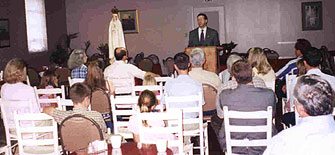
It is hard to walk the streets of New Orleans without running into Catholic Louisiana. Majestic churches and buildings predating our nation’s birth abound. One senses not just the presence of the Church but a whole Catholic culture that built the city and still permeates the atmosphere.
Outside New Orleans
Venturing outside New Orleans, the feeling is much the same. It is the little things that impress you: The small historic churches, the connections with the past and the French flavor of life.
In the church in St. Martinsville, I was told, are the baptismal font and Eucharistic sanctuary lamp donated by King Louis XVI which arrived as he was being sent to the guillotine by French revolutionaries. At Sacred Heart Academy near Grand Coteaux, I was taken to a chapel where St. John Berchman appeared and cured a young novice nun. The miracle was one of the two used in St. John Berchman’s canonization process. In the Acadiana region, there are the descendents of the thousands of cruelly persecuted Catholics from British Canada who found a home in the bayous and swamps in the late 18th Century.
Throughout the area, I felt as if I were retracing the footsteps of missionaries, nuns and Jesuits who gave their lives so that Louisiana might have the Faith. St. Katherine Drexel, St. Rose Phillipine Duschene, Blessed Andrew Seelos, and so many others traveled these same roads.
Like the title of the TFP’s book, I could not help but reflect upon how the Church in Louisiana has indeed weathered many storms. I pray that She might yet weather more.
Talking to Catholics
Catholic Louisiana cannot be reduced to old buildings and past memories. Perhaps the most expressive part of a visit is talking to Catholics themselves.
During the speaking tour through southern Louisiana, I saw that explosive mixture of Faith and culture that forms a whole society. Despite the ravages of modernity, remnants of a Catholic culture still survive that make for a refreshing experience not often seen in secular America.
You can see it in that Catholic consideration for others that goes a few steps beyond normal Southern hospitality. So contrary to cold business-like relationships, the Catholic Louisianans I met were effusive, affectionate and given to conversation. They know how to enjoy the thoroughly “Catholic” experience of eating well and guests are treated to the delights of Cajun cooking, New Orleans’ cuisine or the ceremony of a crawfish boil.
I was edified to find huge Catholic families that will get together for a Cajun feast and afterwards gather all, young and old, to recite the rosary. I was impressed with the general overtone of the faithful attached to priest and parish and how this frontally clashes with the proposed democratic reforms denounced in our book.
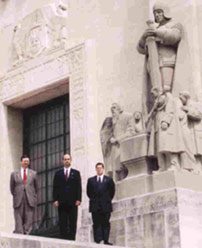
Protest in Baton Rouge
As the speaking tour was finishing, I received word of a pending piece of Louisiana legislation that suddenly added a political dimension to our Church Shall Prevail Campaign. House Bill 1341 is now in committee which would specifically force priests to reveal sins heard in confession when child abuse is involved.
Many Louisiana homeschoolers are concerned that the bill could target parents having difficulties with their children and who ask advice in the confessional. There is no evidence such a measure would help the problem. On the contrary, many point to the fact that turning priests in the confessional into informers of the state is usually associated with a communist or Nazi regime and not a free country.
To look into the matter, TFP members in Louisiana visited the Capitol building and they are presently rallying the TFP’s many friends and supporters to oppose this measure.
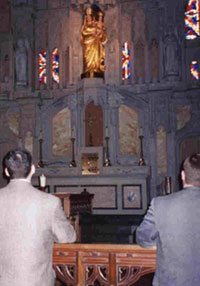
Asking Prompt Succor
A short working visit is never long enough. It is easy to leave with hasty or even false impressions.
However, there is one place that leaves you with a true and lasting impression. You cannot leave Catholic Louisiana without a visit to the Ursuline Convent in New Orleans. There you will find the miraculous statue of Our Lady of Prompt Succor.
This impressive statue is a spiritual highpoint of any visit to the state. Books could be written about the miracles, graces and blessings showered upon her devotees. I am sure many pages are yet to be written.
Under the maternal gaze of this extraordinary French statue, you feel a certainty of being heard, an overwhelming kindness and special solicitude. You leave not only knowing that succor is forthcoming but that it is coming promptly!
Amid the crisis that afflicts the Church, that is exactly what is needed: prompt succor. May she grant it to all those who have chosen the less traveled path of standing up for Catholic doctrine and morality and weathering the modern day storm.

